Up here we feel a bond with our older sister to the South. Legend has it that it started with Louis Armstrong, tired of the racist Jim Crow South, getting on a train in New Orleans and riding it to the end of the line, at Chicago. He was followed by wave after wave of migrants from the Delta, usually getting off at the old 63rd Street Station (nothing there but a church parking lot now). They brought with them the religion, food, dialect, and most famously music which came to define so much of what 20th Century Chicago. Passenger rail isn't so important anymore, but the railroad still forms a kind of steel umbilical cord tying Chicago to a region millions of its residents or their ancestors once called home.
A region which is currently enduring what must be the worst natural disaster this country has seen in my lifetime. Whole towns have been destroyed. Dozens, if not hundreds, of people have died. And our sister city to the South? Floodwaters laid seige last night, but her walls held for a time, even as the highway bridges spanning Lake Pontchartrain were swept away. But this morning the levees broke in three places, and most of the city is now underwater as the Army Corps of Engineers desperately struggle to full the gaps. At this point it's unclear what will remain of our beautiful sister, but it's clear the loss of life could be severe. We're not even dealing with dead bodies," Mayor Ray Nagin said. "They're just pushing them on the side."
I really have nothing insightful to add to all the horrible news you've doubtless already heard today, but it's on my mind and I felt like I had to say something on the day New Orleans fell. I haven't been there in years, not since my high school marching band joined a few Mardi Gras parades when I was 15, but it sure left an impression.
Wells, I hope you took pictures.
If I hear about anything we could do to help, I will post it here.
My irregular musings on city life, politics, baseball, roller derby, and whatever happens to be getting my goat today.
Tuesday, August 30, 2005
Tuesday, August 23, 2005
Rumors of my death have been greatly exaggerated
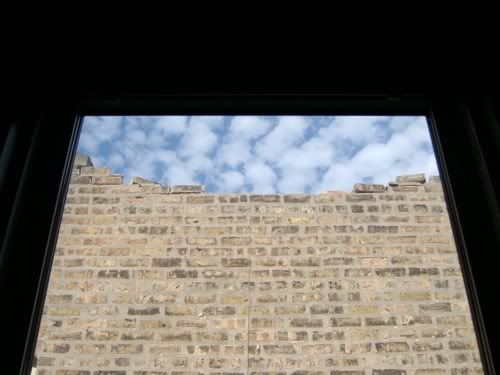
Air show this weekend. We didn’t go this year (not in the mood for militarism) but you could hear the blasting jet engines all over time. The sound reminds me of the days after 9/11 when all civilian flights were grounded and NATO fighters were patrolling the skies over Chicago.
We watched the disaster unfold on television in a friend’s seventh floor apartment in Hyde Park. When the first fighter planes cruised overhead, she yelled OH MY GOD THEY”RE COMING!!! And hit the floor. No, it wasn’t funny later, it was funny right the fuck then, you could feel the tension breaking like ice snapping in a glass of gin.
Anyway, I haven’t been writing lately. For one thing, much of the interesting stuff that’s gone on in the last couple weeks has been at work, and I just won’t blog about that. It would be damned unprofessional. But it leaves me drained, and it’s hard to find the energy to talk about other things.
Big things are up in the neighborhood. Developers’ minions have torn down the apartment building next door and are pouring the foundation for a new one, all without the benefit of a valid city permit!
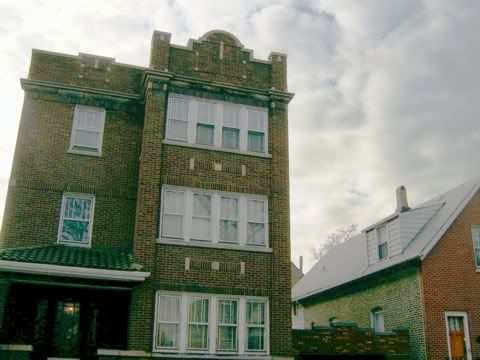
The street that was . . .
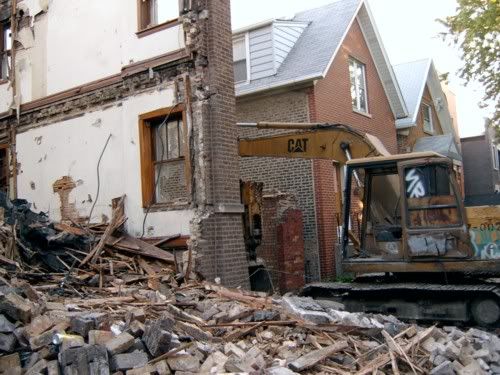
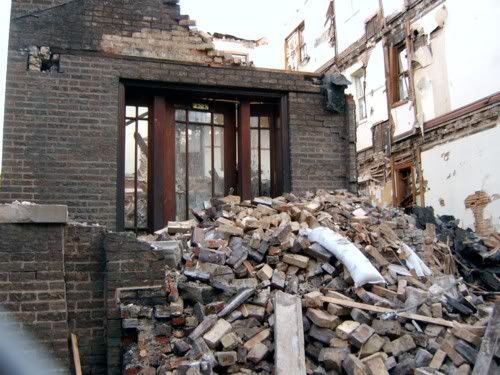
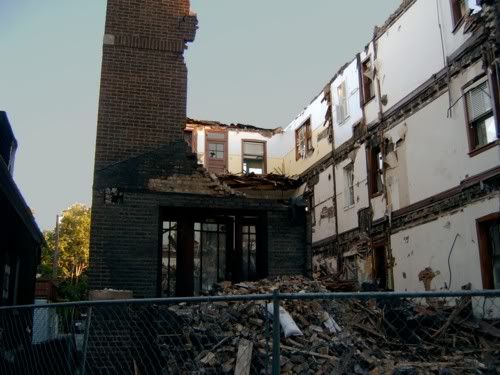
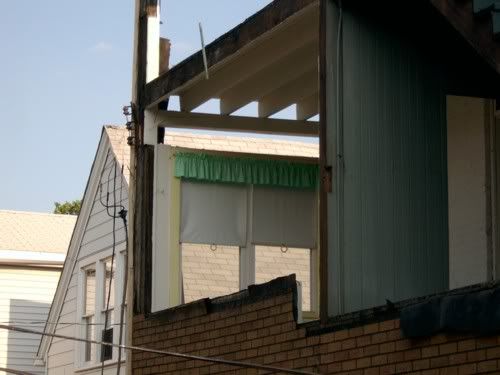
The demolition made a big mess. Debris fell in our back yard, and the fence caved in and blocked the sidewalk which leads to the entrance to our charming upstairs neighbor's place. They have stopped delivering her mail. Did I mention they don't have a permit? Trope has informed the Alderman's office.
Still, I hope they aren't stopped from finishing the project because the big hole is ghastly.
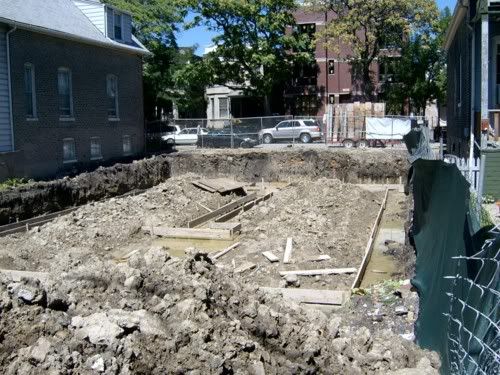
The Pit
I hated to see the old place go, it had class, and really nice woodwork. We walked around in there the week before it was demolished and took some nice little souvenirs – the little manual doorbells from the back stairwell, you spin the wind-up key and it makes a ring like an old telephone with a real bell – most of my readers may not even remember what that sounds like, although a coworker has a sample of one as a ring ton for his cell. I wish the place had been rehabbed or condo-ized rather than demolished, but I don’t know if we could start a family in so little space either. All this new construction is adding larger units to the city, which is good, but it’s doing so in such a way that makes it almost impossible for regular people to afford housing. Unfortunately, the kind of reform that would make a decent place to live in a decent neighborhood affordable for the rest of us will never be untertaken, because Americans count on rising home prices to finance their retirement. In other words, people who are already homeowners see rising property values as a good thing, and will fight any effort to drive prices down. So those of us who were born too late are S.O.L., I guess.
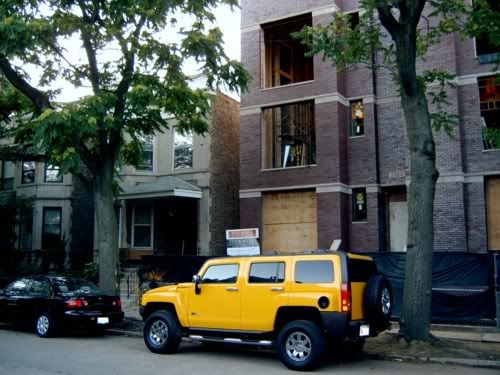
This picture says it all and doesn't need a caption. Yuck. This is what's happening to our neighborhood, which used to be cool.
Didn't mean to end on a grumpy note but I'm tired. Tomorrow there will be happy fun garden pictures, as well as some "what I did with my summer vacation" stuff.
Wednesday, August 03, 2005
you can't stop the signal
I'm not a big fan of the Wall Street Journal, especially it's editorial page, but I've been following the work of their man in Basra, Stephen Vincent, for several months. I found his perspective very informative, he seemed to be somewhat of a conservative who would like to be a war supporter, but also very honest in his depiction of what has been going on in Basra, supposedly a bright spot on the dreary Iraqi horizon. He was quite disturbed by what he saw and in the past couple months I've read some very intersting pieces by Vincent, which were trying to draw attention to what he was seeing there.
On Sunday, he had an Op-Ed piece in the New York Times depicting the overarching, repressive power wielded by Iranian-backed Shi'ite fundamentalist religious parties and militias in Basra. Yesterday, he was murdered. He was not a journalist caught in the crossfire of some clash between soldiers and insurgents, he was assassinated because of something he'd written. Since his recent work has focused on the penetration of the Basra police force, militiamen riding along with police and "disappearing" political opponents of the regime, it is likely that his murder was committed or ordered by Basra police.
The New York Times piece will go to archive in a few days, so I'm taking the unusual step of reprinting the whole damn thing here. He can't get royalties for it anyway, he's dead, and I figure if someone's going to kill him to shut him up, I want to make sure everyone hears him loud and clear. Also, here's a link to his blog, In The Red Zone. Check it out while it's still up.
Stephen Vincent was the 49th journalist to be killed in the Iraq conflict. He was murdered by police officers loyal to a fundamentalist religious regime installed in power by you government, a regime which intimidates, tortures and kills its political and religious opponents, a regime which your soldiers are being asked to risk their lives, every day, to protect. Hypocrisy is on the march!
. . . but the truth will out. Pass it on.
On Sunday, he had an Op-Ed piece in the New York Times depicting the overarching, repressive power wielded by Iranian-backed Shi'ite fundamentalist religious parties and militias in Basra. Yesterday, he was murdered. He was not a journalist caught in the crossfire of some clash between soldiers and insurgents, he was assassinated because of something he'd written. Since his recent work has focused on the penetration of the Basra police force, militiamen riding along with police and "disappearing" political opponents of the regime, it is likely that his murder was committed or ordered by Basra police.
The New York Times piece will go to archive in a few days, so I'm taking the unusual step of reprinting the whole damn thing here. He can't get royalties for it anyway, he's dead, and I figure if someone's going to kill him to shut him up, I want to make sure everyone hears him loud and clear. Also, here's a link to his blog, In The Red Zone. Check it out while it's still up.
Switched Off in Basra
By STEVEN VINCENT
Published: July 31, 2005
Basra, Iraq
THE British call it being "switched on" - a state of high morale and readiness, similar to what Americans think of as "gung ho" attitude. During the 10 days I recently spent embedded with the British-led multinational force in this southern Iraqi city, I met many switched-on soldiers involved in what the British call "security sector reform." An effort to maintain peace while training Iraqis to handle their own policing and security, security sector reform is fundamental to the British-American exit strategy. As one British officer put it, "The sooner the locals assume their own security, the sooner we go home."
From this perspective, the strategy appears successful. Particularly in terms of the city police officers, who are proving adept at the close-order drills, marksmanship and proper arrest techniques being drilled into them by their foreign instructors. In addition, police salaries are up, the officers have shiny new patrol cars, and many sport snazzy new uniforms. Better yet, many of these new Iraqi officers seem switched-on themselves. "We want to serve our country" is a repeated refrain.
From another view, however, security sector reform is failing the very people it is intended to serve: average Iraqis who simply want to go about their lives. As has been widely reported of late, Basran politics (and everyday life) is increasingly coming under the control of Shiite religious groups, from the relatively mainstream Supreme Council for the Islamic Revolution in Iraq to the bellicose followers of the rebel cleric Moktada al-Sadr. Recruited from the same population of undereducated, underemployed men who swell these organizations' ranks, many of Basra's rank-and-file police officers maintain dual loyalties to mosque and state.
In May, the city's police chief told a British newspaper that half of his 7,000-man force was affiliated with religious parties. This may have been an optimistic estimate: one young Iraqi officer told me that "75 percent of the policemen I know are with Moktada al-Sadr - he is a great man." And unfortunately, the British seem unable or unwilling to do anything about it.
The fact that the British are in effect strengthening the hand of Shiite organizations is not lost on Basra's residents.
"No one trusts the police," one Iraqi journalist told me. "If our new ayatollahs snap their fingers, thousands of police will jump." Mufeed al-Mushashaee, the leader of a liberal political organization called the Shabanea Rebellion, told me that he felt that "the entire force should be dissolved and replaced with people educated in human rights and democracy."
Unfortunately, this is precisely what the British aren't doing. Fearing to appear like colonial occupiers, they avoid any hint of ideological indoctrination: in my time with them, not once did I see an instructor explain such basics of democracy as the politically neutral role of the police in a civil society. Nor did I see anyone question the alarming number of religious posters on the walls of Basran police stations. When I asked British troops if the security sector reform strategy included measures to encourage cadets to identify with the national government rather than their neighborhood mosque, I received polite shrugs: not our job, mate.
The results are apparent. At the city's university, for example, self-appointed monitors patrol the campuses, ensuring that women's attire and makeup are properly Islamic. "I'd like to throw them off the grounds, but who will do it?" a university administrator asked me. "Most of our police belong to the same religious parties as the monitors."
Similarly, the director of Basra's maternity hospital, Mohammad Nasir, told me that he frequently catches staff members pilfering equipment to sell to private hospitals, but hesitates to call the police: "How do I know what religious party they are affiliated with, and what their political connection is to the thieves?"
It is particularly troubling that sectarian tensions are increasing in Basra, which has long been held up as the brightest spot of the liberated Iraq. "Are the police being used for political purposes?" asked Jamal Khazal Makki, the head of the Basra branch of the Sunni-dominated Islamic Party. "They arrest people and hold them in custody, even though the courts order them released. Meanwhile, the police rarely detain anyone who belongs to a Shiite religious party."
An Iraqi police lieutenant, who for obvious reasons asked to remain anonymous, confirmed to me the widespread rumors that a few police officers are perpetrating many of the hundreds of assassinations - mostly of former Baath Party members - that take place in Basra each month. He told me that there is even a sort of "death car": a white Toyota Mark II that glides through the city streets, carrying off-duty police officers in the pay of extremist religious groups to their next assignment.
Meanwhile, the British stand above the growing turmoil, refusing to challenge the Islamists' claim on the hearts and minds of police officers. This detachment angers many Basrans. "The British know what's happening but they are asleep, pretending they can simply establish security and leave behind democracy," said the police lieutenant who had told me of the assassinations. "Before such a government takes root here, we must experience a transformation of our minds."
In other words, real security reform requires psychological as well as physical training. Unless the British include in their security sector reform strategy some basic lessons in democratic principles, Basra risks falling further under the sway of Islamic extremists and their Western-trained police enforcers.
Steven Vincent, the author of "In the Red Zone: A Journey Into the Soul of Iraq," is writing a book about Basra.
Stephen Vincent was the 49th journalist to be killed in the Iraq conflict. He was murdered by police officers loyal to a fundamentalist religious regime installed in power by you government, a regime which intimidates, tortures and kills its political and religious opponents, a regime which your soldiers are being asked to risk their lives, every day, to protect. Hypocrisy is on the march!
. . . but the truth will out. Pass it on.
Subscribe to:
Posts (Atom)